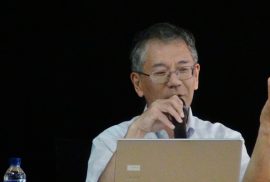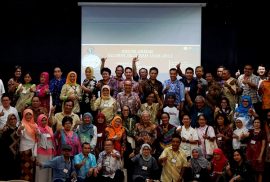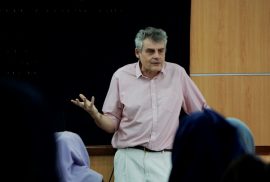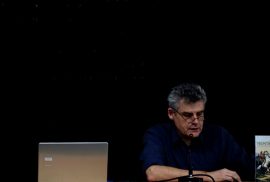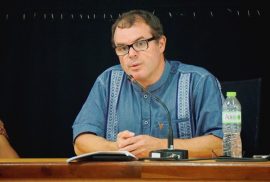Demographic issues have emerged as a common topic nowadays. According to LIPI’s report, in the years 2020 until 2030, Indonesia will get a demographic bonus. At that time, the population in Indonesia will increase. The number of productive age population (17-64 years) will be more than the non-productive age. The comparison touches the number of 70 to 30 percent. This is in contrast to the situation in Japan. The population curve in the land of the ‘rising sun’ forms an inverted triangle. Japan suffers from the burden of a large aging population.
Isu penduduk cukup mendapat perhatian akhir-akhir ini. Di Indonesia, menurut laporan LIPI, pada 2020-2030 nanti, Indonesia akan mendapat bonus demografi. Berdasarkan perhitungan, pada rentang tahun itu proporsi jumlah penduduk Indonesia mengalami tingkatan yang baik jika dilihat dari segi ekonomi. Jumlah penduduk usia produktif (17-64 tahun) akan lebih banyak dari usia non-produktif. Perbandingannya menyentuh angka 70 banding 30 persen. Hal ini berbanding terbalik dengan keadaan yang ada di Jepang. Kurva penduduk di negeri ‘matahari terbit’ itu membentuk segitiga terbalik. Jepang mengalami beban penduduk usia senja yang banyak.
Saturday morning (18/3) the atmosphere in the courtyard of the Poerbatjaraka building, Faculty of Cultural Sciences, UGM was suddenly crowded. Several people were seen shaking hands and laughing. Not a few also hug. That day the History Department held a Grand Reunion. The event was held for two days, March 18-19 at the Faculty of Cultural Sciences UGM. Participants consisted of history alumni from various generations and strata. The organizing committee -which consists of several initiators from the alumni circle- carries the theme “The Past Is Always Actual”.
Sabtu pagi (18/3) suasana pelataran gedung Purbatjaraka Fakultas llmu Budaya UGM mendadak ramai. Beberapa orang terlihat bersalaman lalu tertawa. Tidak sedikit pula yang berpelukan. Hari itu Departemen Sejarah UGM menggelar Reuni Akbar. Acara itu dihelat selama dua hari yakni 18-19 Maret bertempat di Fakultas Ilmu Budaya UGM. Peserta terdiri dari alumni sejarah berbagai angkatan dan strata. Panitia penyelenggara -yang terdiri dari beberapa inisiator dari kalangan alumni- mengusung tema “Masa Lalu Selalu Aktual”.
The New Order became an important material in the study of contemporary Indonesian history. Not only because of the length of time in power – namely 32 years, but the New Order gave a historical legacy, which is still being felt today. However, what became interesting for researchers was how the New Order state scheme worked. UGM historian, Farabi Fakih, in his dissertation said that the New Order was a Managerial State. A terminology that shows that the New Order worked like a corporation.
Benevolent Bandits?
At that time Prof. David Henley started the presentation with a question. Was the New Order good bandits? In his research, he uses a political perspective by borrowing the concept of a stationary bandit. In simple terms, stationary bandits are political elites (central) who use their power for the wrong purpose – namely strengthening networks and then fulfilling personal interests – by forming groups in other areas of the country. The concept was introduced by Mancur Olson in his book Power and Prosperity. Mancur Olson selected Russia in the early 1990s and China in the early 20th century as sample areas.
Orde Baru menjadi materi penting dalam kajian sejarah Indonesia kontemporer. Bukan saja karena lama waktu kekuasaan –yakni 32 tahun. Akan tetapi Orde Baru memberikan satu warisan sejarah, yang sampai sekarang masih dirasakan. Bahkan pada beberapa kasus warisannya malah diproduksi kembali pada masa reformasi –setelah Orde Baru tumbang. Meski begitu yang menjadi menarik bagi peneliti adalah bagaimana skema negara Orde Baru bekerja. Sejarawan UGM, Farabi Fakih, dalam disertasinya menyebut Orde Baru adalah Managerial State. Suatu terminologi yang menunjukan bahwa Orde Baru bekerja layaknya korporasi.
Peter Boomgaard became important in the development of Indonesian historiography. For some historians his expertise in pioneering environmental history is a challenge. He provides an alternative to mainstream historiography – which used to be militaristic and political. Why is this environmental historiography unique? Boomgaard’s idea no longer places human relations between humans – which is a feature of political, military, or even social historiography in subsequent social developments. History is not about war and power. Peter Boomgaard does not eliminate the role of humans, because humans are an important element of history. However, – through the idea of environmental history – he has the idea that history is also the relationship between humans and nature. So history has wider interdisciplinary possibilities, even including the realm of science which is no longer fixated on the social science approach. So history can discuss the relationship between humans and nature: interactions with fauna, natural disasters, and the history of disease outbreaks.
Peter Boomgaard menjadi penting dalam perkembangan historiografi Indonesia. Bagi beberapa sejarawan kepakarannya dalam memelopori sejarah lingkungan merupakan perlawanan. Ia memberikan alternatif historiografi arus utama –yang dulu cenderung militeristis dan politis. Mengapa historiografi lingkungan ini menjadi unik? Gagasan Boomgaard tidak lagi menempatkan relasi manusia antar manusia -yang menjadi corak historiografi politis, militer, atau pun pada perkembangan selanjutnya sosial. Sejarah bukanlah perihal perang, dan kekuasaan. Peter Boomgaard tidak menihilkan peran manusia, karena manusia merupakan elemen penting dari sejarah. Akan tetapi, -melalui ide sejarah lingkungan- ia mempunyai gagasan bahwa sejarah juga adalah relasi manusia dengan alam. Maka sejarah mempunyai kemungkinan interdisipliner yang lebih luas, bahkan termasuk ranah sains tidak lagi terpaku pada pendekatan ilmu sosial saja. Maka sejarah bisa membahas tentang relasi manusia dengan alam : interaksi dengan fauna, bencana alam, dan sejarah tentang wabah penyakit.
The History Department of FIB UGM held public lectures in succession. on Friday (10/2) and Monday, (13/2). The public lecture invited Dr. Russell Field of the University of Manitoba. He is an assistant professor who specializes in sports, particularly sports and politics. At the first meeting, Friday (10/2), Dr. Russell focuses more on sports and historiography.
From the research results of Dr. Russell on Ganefo there are some interesting findings. Ganefo which was held in 1963 was not held without consideration. it is a symbolic embodiment of Soekarno’s vision. Views on Asian-African unity, decolonization spirit and Anti-imperialism. In its development, Ganefo became a rival to the Olympics. Because according to Soekarno and several figures from the eastern block countries at that time, sport could be a means of infiltrating western to eastern culture. That’s what they then fought.
Masih sangat jarang, dalam historiografi Indonesia pada khususnya yang membahas olah raga sebagai topik kajian sejarah. Berpijak dari hal itu, Departemen Sejarah FIB UGM mengadakan kuliah umum secara beruntun. Masing-masing pada Jumat (10/2) dan Senin, (13/2). Kuliah umum mengundang Dr. Russell Field dari University Of Manitoba. Ia adalah assisten Profesor yang menggeluti tema olah raga, khususnya relasi olah raga dan politik. Pada pertemuan pertama, Jumat (10/2), Dr. Russel lebih menyoroti olah raga dan historiografi.

